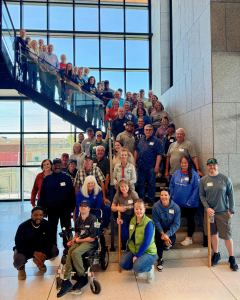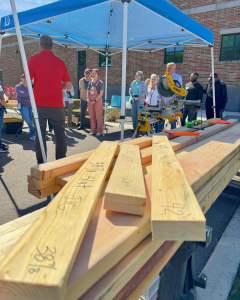SLEEP IN HEAVENLY PEACE ANNOUNCES 11 NEW CHAPTERS
No child should sleep on the floor. Sleep in Heavenly Peace is thrilled to announce 11 new chapters and 12 existing chapters with new leadership.
With more than 160,000 kids currently waiting for beds nationwide, this expansion of new chapters is critical to reaching underserved communities and sustaining SHP's mission to end child bedlessness. The training provided chapter leadership and core team members with the skills and knowledge needed to successfully lead their local non-profit efforts.
"We're excited to welcome new leaders to the SHP family," said Amy Andrew, Director of Training at Sleep in Heavenly Peace. "Their dedication to serving children in need inspires us as we work together to provide a good night's sleep for every child in their communities."
The Need for Quality Sleep
An estimated three percent of children in the United States lack a bed, often forced to sleep on the floor, couch, air mattress or crowded with other family members. A good night's sleep is fundamental for a child's healthy development, impacting everything from physical growth to cognitive function and emotional well-being.
SHP: Empowering Volunteers to Make a Difference
SHP chapters are powered by passionate volunteers, including Presidents, Vice Presidents and Core Teams. These leaders undergo a two-day immersive training program that equips them with the necessary skills to manage their local non-profit effectively. The chapter training covers leadership and management, development and fundraising, marketing strategies, and bed-building expertise.
"I have a social impact skateboard and bike brand that puts art on skateboards – and we impact kids in the inner city. My 'why' is unique. I didn't know why I had such an affinity for Sleep in Heavenly Peace. My 'why' is: I was one of those kids who didn't have a bed, which I can reflect back on as just a rough period of our life," shared Jay Jones, self-proclaimed "Hood Hope Dealer" and delivery hub volunteer with SHP-AZ, Phoenix. "When I started volunteering with SHP, I found myself on the same street my dad grew up on, in the south side of Phoenix; we delivered beds to a two-room building with nine siblings. I got to go in there and kind of redeem that piece of my life by delivering beds to kids in that neighborhood. We get to be the hope that we seek to see. We can be the hope catalysts."
New Chapters
With over 350 chapters and growing, SHP continues to fulfill its mission to ensure every child has a safe and comfortable bed to call their own. The following new chapters will be based in and serve these communities:
• San Jose, California
• Jackson County, Georgia
• Duluth, Minnesota
• Charlotte South, North Carolina
• Sanford, North Carolina
• Clermont County, Ohio
• Bedford County, Tennessee
• Memphis South, Tennessee
• Salt Lake, Utah
• Stevens Point, Wisconsin
• Jackson County, West Virginia
These chapters are celebrating new leadership:
• Phoenix/Downtown, Arizona
• Alameda County, California
• Grand Junction, Colorado
• Columbus, Georgia
• Sioux City, Iowa
• Johnson County, Iowa
• Louisville West, Kentucky
• Howard County, Maryland
• Iredell County South, North Carolina
• Cookeville, Tennessee
• College Station, Texas
• Harrison County, West Virginia
Learn about volunteering, donating, or partnering with SHP and bringing a good night's sleep to a child near you at: shpbeds.org. Start a chapter in your community: shpbeds.org/start.
About
Sleep in Heavenly Peace (SHP) is a 501(c)(3) non-profit dedicated to building and delivering beds to children in need. Fueled by volunteers' kindness and donor generosity, we're growing our impact across the U.S. and beyond. We believe a bed is a basic need for a child's well-being, and our mission is simple: NO KID SLEEPS ON THE FLOOR IN OUR TOWN!® Learn more and get involved at shpbeds.org.
Leigh Ann Dufurrena
Sleep in Heavenly Peace
public.relations@shpbeds.org
Visit us on social media:
LinkedIn
Instagram
Facebook
YouTube
X
Legal Disclaimer:
EIN Presswire provides this news content "as is" without warranty of any kind. We do not accept any responsibility or liability for the accuracy, content, images, videos, licenses, completeness, legality, or reliability of the information contained in this article. If you have any complaints or copyright issues related to this article, kindly contact the author above.
ProSat Networks Expands Coverage for Starlink Installation in Arizona
1290457 B.C. LTD. ANNOUNCES FILING OF AMENDED AND RESTATED INTERIM FINANCIAL STATEMENTS
Sun City Flowers Braces for Record-Breaking Mother’s Day Orders in One of America’s Largest 55-Plus Communities
Kalendarium
Więcej ważnych informacji
 Jedynka Newserii
Jedynka Newserii

 Jedynka Newserii
Jedynka Newserii

Bankowość

Coraz mniej kredytów bankowych płynie do polskiej gospodarki. Przed sektorem duże wyzwania związane z finansowaniem strategicznych projektów
Polskie przedsiębiorstwa w coraz mniejszym stopniu finansują się kredytem bankowym, zwłaszcza w porównaniu z rosnącym PKB. Powoduje to wysoką nadpłynność sektora bankowego. Deregulacja mogłaby pomóc w skróceniu drogi firm do finansowania bankowego, zwłaszcza że Polskę czekają ogromne wydatki na transformację energetyczną i obronność. Sektor ma bardzo dobre wyniki finansowe, co powoduje, że politycy patrzą w stronę jego zysków. Ryzyko prawne, jakim wciąż są kredyty frankowe, pociąga za sobą brak zainteresowania ze strony zagranicznych inwestorów.
Firma
Bezrobocie może zacząć rosnąć. Ochłodzenie odczuwane szczególnie w branży budowlanej i automotive

W Polsce od kilku lat stopa bezrobocia utrzymuje się poniżej 6 proc., a według metodologii unijnej jest o połowę niższa i jedna z najniższych w Unii. Pracownicy przywykli już, że sytuacja na rynku pracy jest dla nich korzystna. Jednak zaczynają się pojawiać pierwsze niepokojące sygnały zwiastujące możliwą zmianę trendu. Część branż ucierpiała np. z powodu spowolnienia w Niemczech, inne rozważają wybór innej niż Polska lokalizacji ze względu na wysokie koszty pracy czy energii. Na razie ogromnym wyzwaniem pozostaje aktywizacja osób biernych zawodowo.
Ochrona środowiska
Rozwój sztucznej inteligencji drastycznie zwiększa zapotrzebowanie na energię. Rozwiązaniem są zrównoważone centra danych

Centra danych to jeden z dynamicznie rozwijających się, ale przy tym energochłonnych sektorów gospodarki. Prognozy PMR wskazują, że do 2030 roku operatorzy w Polsce będą dysponować centrami danych o mocy przekraczającej 500 MW, co oznacza, że wzrośnie ona ponad trzykrotnie względem 2024 roku. Przyspieszona cyfryzacja i dynamiczny rozwój sztucznej inteligencji sprawiają, że w ciągu kilku następnych lat zużycie energii elektrycznej w centrach danych tylko w Europie wzrośnie o 66 proc. Dlatego coraz więcej firm sięga po zrównoważone rozwiązania i energię pochodzącą ze źródeł odnawialnych.
Partner serwisu
Szkolenia

Akademia Newserii
Akademia Newserii to projekt, w ramach którego najlepsi polscy dziennikarze biznesowi, giełdowi oraz lifestylowi, a także szkoleniowcy z wieloletnim doświadczeniem dzielą się swoją wiedzą nt. pracy z mediami.




![Europejskie miasta planują wzrost inwestycji w infrastrukturę społeczną. Wydatki na niskoemisyjny transport wciąż są niewystarczające [DEPESZA]](https://www.newseria.pl/files/1097841585/panel-dotacje-foto,w_85,_small.jpg)





.gif)

 |
| |
| |
|